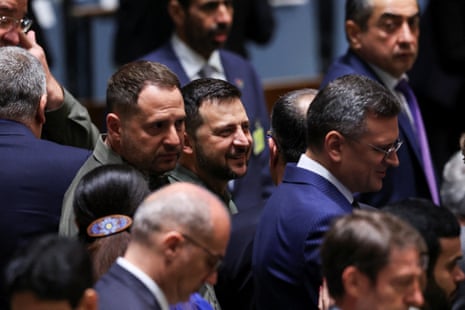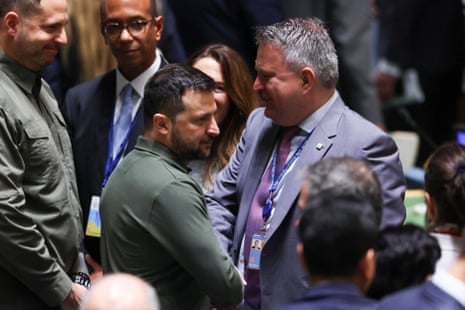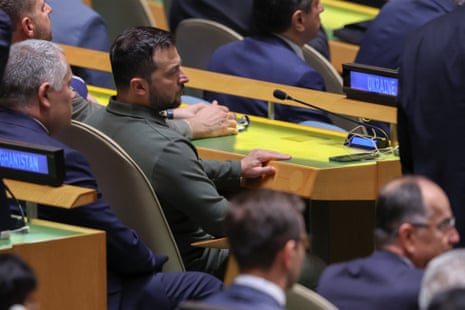UN chief warns ‘our world is becoming unhinged’ in general assembly opening speech

Patrick Wintour
The world is becoming unhinged as geopolitical tensions rise and the world seems incapable of coming together to respond to mounting global challenges, the UN secretary general António Guterres said in his speech opening of the UN general assembly in New York.
He warned global governance was “stuck in time” at a point when strong modern multilateral institutions are in greater need than ever before.
Reflecting on a year in which the UN has seemed paralysed by the divisions over the war in Ukraine., Guterres put those divisions in a broader context saying:
We cannot effectively address problems as they are if institutions don’t reflect the world as it is. Instead of solving problems, they risk becoming part of the problem.
He said “divides were deepening among economic and military powers, and between North and South, East and West”.
Returning to a theme that has appeared in many of his speeches for three or more years he said:
We are inching ever closer to a Great Fracture in economic and financial systems and trade relations; one that threatens a single, open internet; with diverging strategies on technology and artificial intelligence; and potentially clashing security frameworks.
The world’s response to climate change was still falling “abysmally short”, he said.
Guterres has been criticised for issuing a series of arresting but increasingly dark warnings about the plight of the world that are not achieving the impact, so his aides stressed that his speech, while candid about the challenges, was one of his most “solution heavy”.
He called for deep reforms to the “dysfunctional, outdated and unjust” international financial architecture, including a $500bn a year rescue package for those countries most heavily in debt.
On climate he demanded a Climate Solidarity Pact, in which all big emitters make extra efforts to cut emissions; and wealthier countries support emerging economies with finance and technology to do so. He pointed out: “Africa has 60%of the world’s solar capacity – but just 2% of renewable investments”.
Specifically he called for “an end to coal – by 2030 for OECD countries and 2040 for the rest of the world. An end to fossil fuel subsidies and price on carbon. Developed countries must finally deliver the $100bn for developing country climate action, as well as double adaptation finance by 2025,”
He also broke newer policy ground by putting artificial intelligence – something he described as a subject of awe and fear – at the heart of the UN agenda confirming he was appointing a high level panel to report to him on its implications by the end of the year. He suggested a new global entity on AI that could provide a source of information and expertise for Member States, equivalent to the Intergovernmental Panel on Climate Change.
He also was more unequivocal than sometimes in his condemnation of Russia’s invasion of Ukraine, and its wider damaging ramifications. He said:
If every country fulfilled its obligations under the UN Charter, the right to peace would be guaranteed. When countries break those pledges, they create a world of insecurity for everyone. Exhibit A: Russia’s invasion of Ukraine.
The war, in violation of the United Nations Charter and international law, has unleashed a nexus of horror: lives destroyed; human rights abused; families torn apart; children traumatized; hopes and dreams shattered. Beyond Ukraine, the war has serious implications for us all. Nuclear threats put us all at risk. Ignoring global treaties and conventions makes us all less safe. And the poisoning of global diplomacy obstructs progress across the board.
Guterres also used his speech to present the disastrous recent floods in Derna, Libya, as “a snapshot of the state of our world” and sign of what happens when climate change meets poor governance. He said those who died in Derna were “victims of years of conflict, victims of climate chaos, victims of leaders – near and far – who failed to find a way to peace. The people of Derna lived and died in the epicentre of that indifference – as the skies unleashed 100 times the monthly rainfall in 24 hours … as dams broke after years of war and neglect”.
Key events
Biden warns against allowing Russia to ‘brutalize’ Ukraine without consequences
Biden says the UN gathering this week is “darkened by the shadow of war”, which he describes as an “illegal war of conquest without provocation by Russia” against Ukraine.
No nation wants the war to end more than Ukraine, he says, reiterating US support for Kyiv and its efforst to bring about “a diplomatic resolution to a just and lasting peace”.
He says Russia along bears the responsibility of the war in Ukraine, and that it alone has the power to end the war immediately.
Russia alone stands in the way of peace because Russia’s price for peace is Ukraine’s capitulation, Ukraine’s territory. Russia will grow weary, allowed to brutalize Ukraine without consequence.
But ask you this: if we abandon the core principles of United States to appease an aggressor, can any member state in this body feel confident that there are protected if you allow Ukraine to be carved up? Is the independence of any nation security?
Biden says the US will continue to stand with the people of Ukraine as they defend their sovereignty and territorial integrity and freedom.
Biden: US to ‘responsibly manage’ competition with China so it does not ‘slip into conflict’
Biden vows to defend democracy around the world, but he emphasises that US partnerships with countries are not about “containing any country”. He says:
On a common set, China, I want to be clear and consistent. We seek to responsibly manage the competition between our countries so does not slip into conflict.
I’ve said we are for de-risking not decoupling in China.
He says the US will push back on aggression and intimidation, but that it stands ready to work together with Beijing on issues that include the climate crisis, which “we see everywhere”.
Biden says the US is committed to sustaining the institutions built at the end of the second world war that are “an enduring bedrock” of the world’s progress.
He says the US is undertaking “serious consultations” with many member states over expanding the UN security council, adding that “we need more voices, more perspectives at the table”.
The UN must “continue to preserve peace, prevent conflict and alleviate human suffering”, Biden says.
He says the US is working to make global institutions such as the World Bank to become more responsive, effective and inclusive. The US will also continue its efforts to reform the World Trade Organization to preserve competition, openness, transparency and the rule of law while also protecting workers, driving the clean energy transition, and promoting inclusive and sustainable growth.
Biden says the G20 has been strengthened as a “vital forum”, citing welcoming the African Union as a permanent member.
Biden: ‘Our future is bound up with yours’
Biden says the US seeks “a more secure, more prosperous and equitable world for all people” because its future is bound with the rest of the world.
No country can meet the challenges of today alone.
He describes that vision as one where “our children do not go hungry and everyone has access to quality health care, where workers are empowered and our environment is protected, where entrepreneurs and innovators everywhere can access opportunity everywhere”.
Joe Biden addresses general assembly
Joe Biden is addressing the general assembly, where he begins by discussing his visit to Vietnam last week, where he stood “on soil once bloody with war”.
The US president says his visit would have been “unthinkable” decades ago, and that it is a “powerful reminder that our history need not dictate our future”.
Let us never forget that we choose to stand together and recognize the common hopes to bind all humanity.
He says leaders gather today at “an inflection point in world history” while holding the power to “bend that arc of history” with “the eyes of the world upon all of you”.
Biden says the US “has to lead this critical moment to work with countries in every region, linking them in common cause, joined together with partners who share a common vision of the future of the world”.
Lula calls for work ‘to create space for negotiations’ on Ukraine war
Lula says the war in Ukraine “exposes our collective inability” to enforce the purposes and principles of the UN Charter.
The Brazilian president says:
We do not underestimate the difficulties in achieving peace, but no solution will be lasting if it is not based on dialogue.
I have reiterated that work needs to be done to create space for negotiations.

Lula says Amazon is ‘speaking for itself’ as he urges more to fight climate change
Lula says he returned as Brazil’s president with a mission to rebuild the nation as a “sovereign, fair, sustainable, supportive” country.
He says Brazil is committed to implementing all 17 sustainable development goals (SDGs), and that it has launched a plan to bring together a series of initiatives to reduce poverty and food insecurity.
Lula vows to fight femicide and all forms of violence against women, and to advocate for the rights of the LGBTQI groups and people of disabilities.
On the issue of climate change, the Brazilian leader says it is vulnerable populations in the global south who are most affected.
The richest 10% of the world’s population are responsible for almost half of all carbon released into the atmosphere. We developing countries do not want to repeat this model.
He says Brazil is the forefront of the energy transition, and that 87% of the country’s electrical power comes from clean and renewable sources.
He says deforestation in the Brazilian Amazon has been reduced by 48%, adding that there are 50 million South Americans living in the Amazon.
The whole world has always talked about the Amazon – now the Amazon is speaking for itself.
Lula begins his speech by saying that he first stood on the UN’s general assembly debate podium exactly 20 years, where he expressed confidence “in the human capacity to overcome challenges and evolve toward superior forms of coexistence”. He says he maintains that “unshakable trust in humanity”, 20 years on.
In 2003, the world had not yet realised the severity of the climate crisis which “knocks on our doors, destroys our homes, our cities, our countries, kills and imposes losses and suffering on our brothers, especially the poorest”, he says.
Lula says hunger was the central theme of his speech 20 years ago, and the world now is increasingly unequal where the 10 richest billionaires have more wealth than the poorest 40% of humanity.
The Brazilian president, Luiz Inácio Lula da Silva, will make the first speech at the general debate, as is tradition.
AP reports that early on, Brazil ventured forward when no other country would volunteer to speak first. Decades later, the South American country retains the pole position at the debate.
As the host country, the US president Joe Biden will speak after Lula.
Biden to warn of Russia’s ability to ‘brutalize Ukraine without consequence’ if UN doesn’t uphold charter

Julian Borger
According to excerpts from his speech released by the White House, Joe Biden will urge the UN general assembly to uphold the UN Charter in its approach to the Russian invasion of Ukraine.
The US and other supporters of Ukraine are very conscious that many countries at the UN, especially the developing nations in the Group of 77, are becoming restive at the focus on Ukraine at the UN, when the death toll from conflict, famine and climate change is so enormous in the Global South. Biden will make clear in his remarks he takes these concerns seriously.
Biden will say:
The United States seeks a more secure, more prosperous, more equitable world for all people, because we know our future is bound up with yours. And no nation can meet the challenges of today alone.
He will frame the Ukraine war as a matter of principle, a matter of national sovereignty and territorial integrity that is essential to all UN members.
“Russia believes that the world will grow weary and allow it to brutalise Ukraine without consequence,” Biden will say.
But I ask you this: If we abandon the core principles of the UN Charter to appease an aggressor, can any member state feel confident that they are protected? If we allow Ukraine to be carved up, is the independence of any nation secure?
The answer is no. We must stand up to this naked aggression today to deter other would-be aggressors tomorrow,” the president will say.
That is why the United States together with our Allies and partners around the world will continue to stand with the brave people of Ukraine as they defend their sovereignty and territorial integrity – and their freedom.
Ukraine’s president, Volodymyr Zelenskiy, has arrived for the opening of the UN’s general assembly general debate. He is scheduled to take the podium later this morning.



UN chief warns ‘our world is becoming unhinged’ in general assembly opening speech

Patrick Wintour
The world is becoming unhinged as geopolitical tensions rise and the world seems incapable of coming together to respond to mounting global challenges, the UN secretary general António Guterres said in his speech opening of the UN general assembly in New York.
He warned global governance was “stuck in time” at a point when strong modern multilateral institutions are in greater need than ever before.
Reflecting on a year in which the UN has seemed paralysed by the divisions over the war in Ukraine., Guterres put those divisions in a broader context saying:
We cannot effectively address problems as they are if institutions don’t reflect the world as it is. Instead of solving problems, they risk becoming part of the problem.
He said “divides were deepening among economic and military powers, and between North and South, East and West”.
Returning to a theme that has appeared in many of his speeches for three or more years he said:
We are inching ever closer to a Great Fracture in economic and financial systems and trade relations; one that threatens a single, open internet; with diverging strategies on technology and artificial intelligence; and potentially clashing security frameworks.
The world’s response to climate change was still falling “abysmally short”, he said.
Guterres has been criticised for issuing a series of arresting but increasingly dark warnings about the plight of the world that are not achieving the impact, so his aides stressed that his speech, while candid about the challenges, was one of his most “solution heavy”.
He called for deep reforms to the “dysfunctional, outdated and unjust” international financial architecture, including a $500bn a year rescue package for those countries most heavily in debt.
On climate he demanded a Climate Solidarity Pact, in which all big emitters make extra efforts to cut emissions; and wealthier countries support emerging economies with finance and technology to do so. He pointed out: “Africa has 60%of the world’s solar capacity – but just 2% of renewable investments”.
Specifically he called for “an end to coal – by 2030 for OECD countries and 2040 for the rest of the world. An end to fossil fuel subsidies and price on carbon. Developed countries must finally deliver the $100bn for developing country climate action, as well as double adaptation finance by 2025,”
He also broke newer policy ground by putting artificial intelligence – something he described as a subject of awe and fear – at the heart of the UN agenda confirming he was appointing a high level panel to report to him on its implications by the end of the year. He suggested a new global entity on AI that could provide a source of information and expertise for Member States, equivalent to the Intergovernmental Panel on Climate Change.
He also was more unequivocal than sometimes in his condemnation of Russia’s invasion of Ukraine, and its wider damaging ramifications. He said:
If every country fulfilled its obligations under the UN Charter, the right to peace would be guaranteed. When countries break those pledges, they create a world of insecurity for everyone. Exhibit A: Russia’s invasion of Ukraine.
The war, in violation of the United Nations Charter and international law, has unleashed a nexus of horror: lives destroyed; human rights abused; families torn apart; children traumatized; hopes and dreams shattered. Beyond Ukraine, the war has serious implications for us all. Nuclear threats put us all at risk. Ignoring global treaties and conventions makes us all less safe. And the poisoning of global diplomacy obstructs progress across the board.
Guterres also used his speech to present the disastrous recent floods in Derna, Libya, as “a snapshot of the state of our world” and sign of what happens when climate change meets poor governance. He said those who died in Derna were “victims of years of conflict, victims of climate chaos, victims of leaders – near and far – who failed to find a way to peace. The people of Derna lived and died in the epicentre of that indifference – as the skies unleashed 100 times the monthly rainfall in 24 hours … as dams broke after years of war and neglect”.
UN chief Guterres: Not all leaders ‘feeling the heat’ of climate change
Guterres moves on to the climate crisis, which he says is “killing people and devastating communities”. He says:
Climate change is not just a change in the weather. Climate change is changing life on our planet. It is affecting every aspect of our world.
This is only the beginning, he says.
We have just survived the hottest days, the hottest months and the hottest days on the books. Every continent, every region and every country is feeling the heat. But I’m not sure at all leaders are feeling that heat.
He says there is still time to keep rising temperatures within the 1.5 degree celsius limits and the Paris agreement, but that will require “drastic” steps to cut greenhouse gas emissions.
We have the receipts. G20 countries are responsible for 80% of greenhouse emissions. They must break their addiction to fossil fuels and stop new coal.

